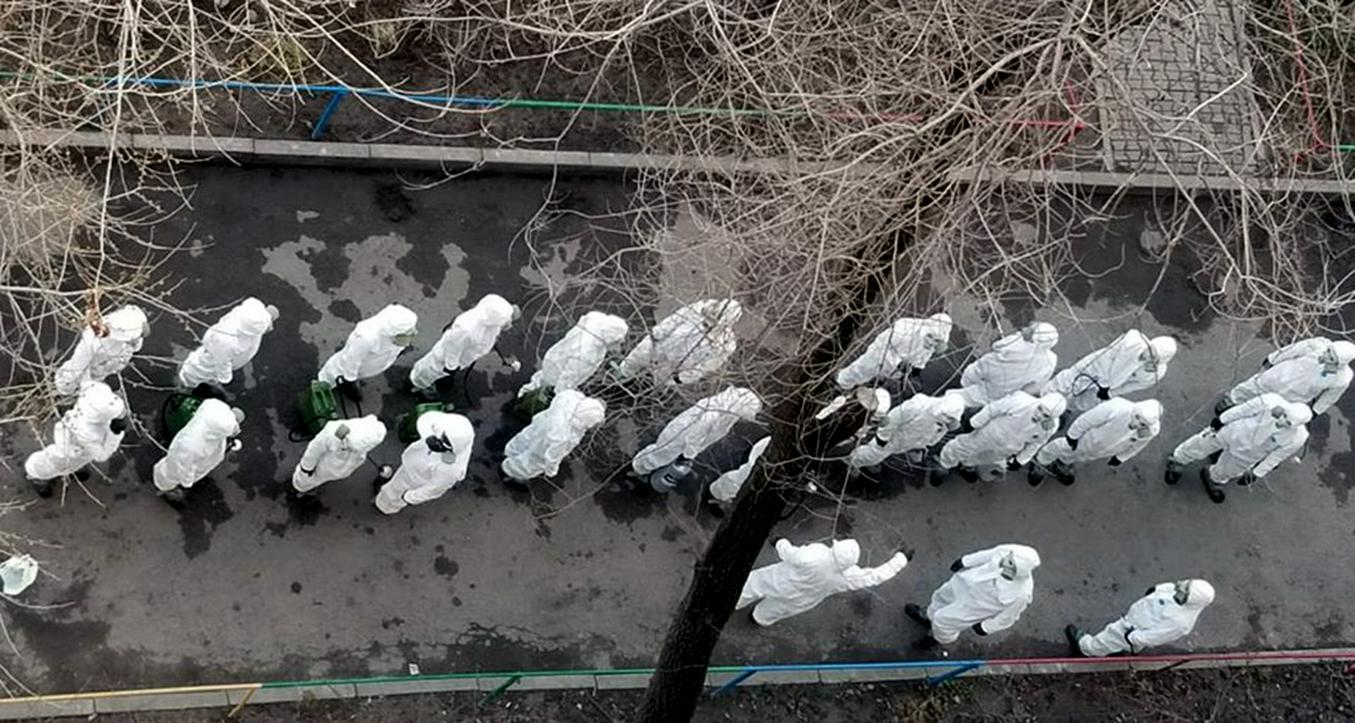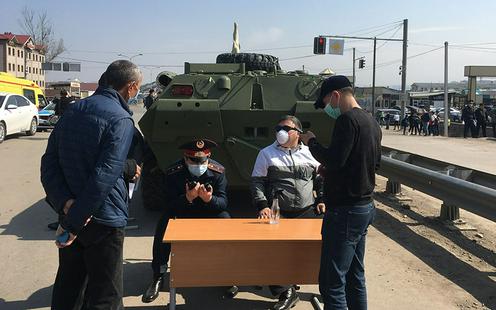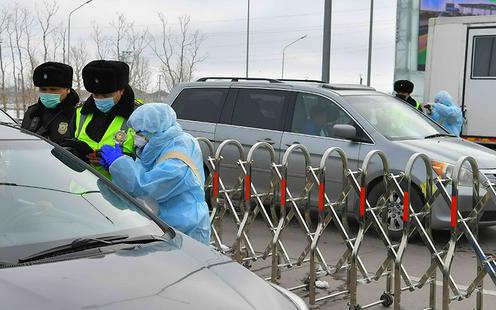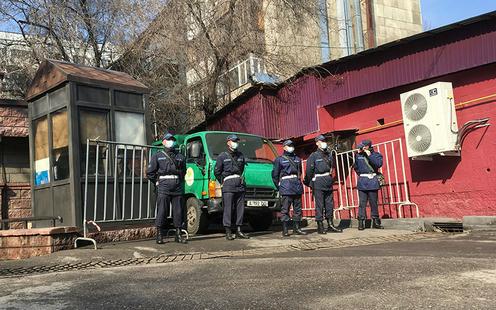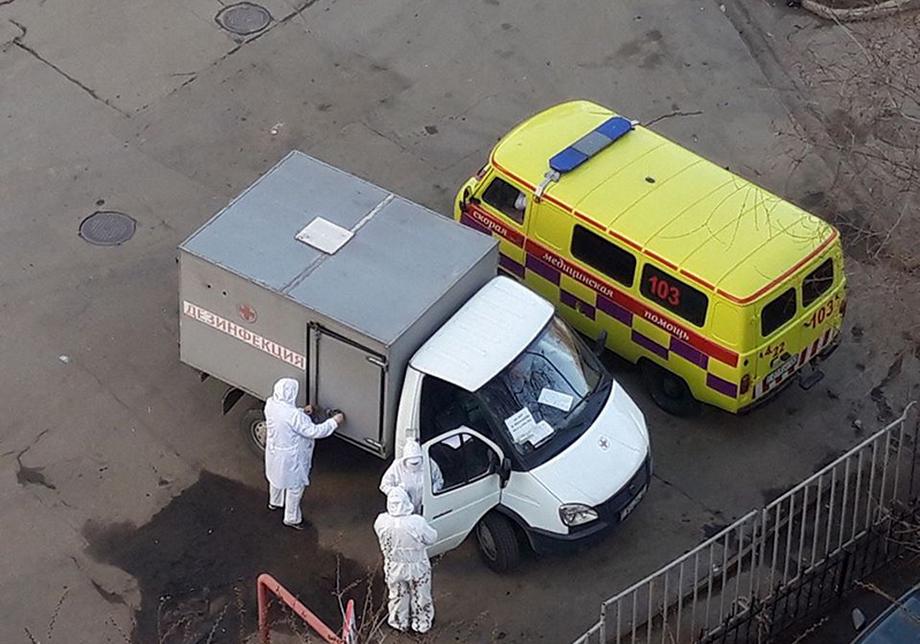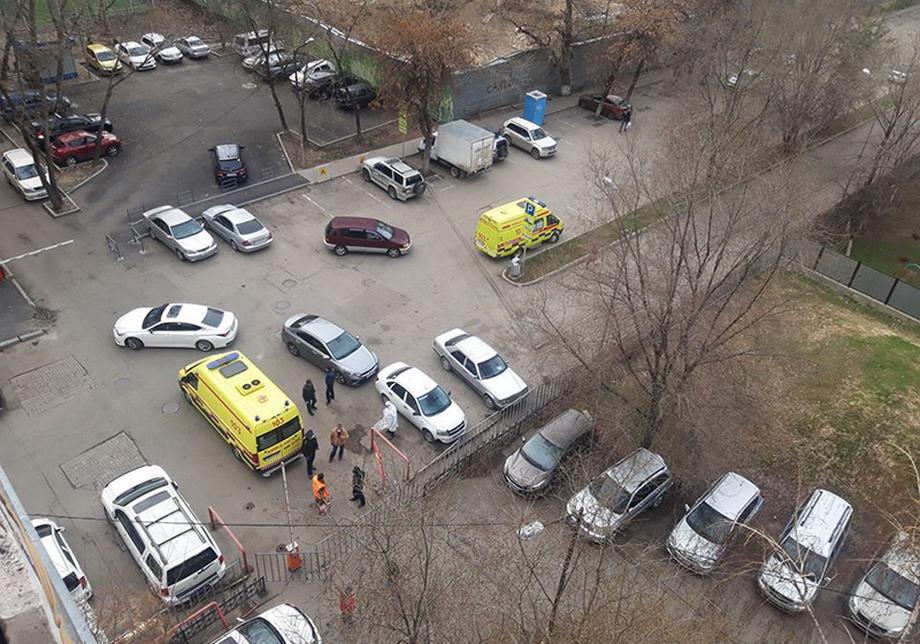Last week, the WHO’s regional director for Europe, Hans Kluge, praised Kazakhstan as a “great example” in the fight against COVID-19. Two months after the first official COVID-19 cases were reported in Central Asia, total infection statistics not just in Kazakhstan, but in neighbours Uzbekistan and Kyrgyzstan too, remain surprisingly low. As of 18 May, Kazakhstan has confirmed 6,440 coronavirus cases, with 35 deaths, Uzbekistan 2,779 cases and 13 deaths, and Kyrgyzstan 1,216 cases and 14 deaths. Just as importantly, numbers of active cases in these countries appear to be on the decline – in fact in Uzbekistan and Kyrgyzstan this has been going on for a month already (though all three countries have shown slight blips in recent days coinciding with moves to gradually reopen the economies). If we leave aside Tajikistan and Turkmenistan, the region does indeed seem to have shown model performance in restricting the spread of COVID-19.
With the exception of Kazakhstan (29,000 tests per million population), testing has admittedly been below that of most European nations and the US, but far higher than many comparable countries (14,000 per million for Uzbekistan, 9,000 for Kyrgyzstan, with the UK and US on around 38,000 and Sweden on 18,000). Even if we allow for unrecorded illness and asymptomatic cases among a young population, as well as for restricted possibilities to challenge the official narrative and perhaps conservative recording of COVID-19 deaths, it seems clear that extensive spread and a much-feared collapse of local health systems have been avoided, thus far. So how has this been achieved?
Importantly, all three countries closed their borders soon after the first cases were reported in the region. Since then they have also implemented some of the world’s most extensive lockdowns. But they also introduced obligatory quarantining – in existing medical facilities, at specially-created quarantine camps, and at home – not only for people who test positive for the virus, but also for tens of thousands of people who have either returned from abroad or who may have come into contact with confirmed cases, and there is increasing evidence that this has been crucial to limiting spread. As early as 6 April, over 150,000 people in Uzbekistan had already been placed in quarantine. By 13 April, nearly 90,000 Uzbeks there were still in quarantine, 67,000 of them at home and nearly 23,000 in medical facilities. State television recently said that this figure has now gone down to 46,000.
To try to convey an idea of how this has been carried out, we have decided to return to earlier material on our Russian website and elsewhere. Here we provide an abridged version of an article by Bagdat Asylbek (from 25 March) on the early quarantine measures implemented in Kazakhstan back in the middle of March. It should be noted that some important changes have been made since then. For one thing, on 1 April the Kazakh authorities introduced an obligatory app for everyone subject to home quarantine, requiring them to make regular reports on their health status and to keep their phones and GPS trackers switched on – thereby removing the need for the kind of resource-intensive early efforts covered below. And from 11 May, new arrivals in Kazakhstan will only be required to spend 48 hours in hospital quarantine while coronavirus tests are taken, followed by a two-week quarantine at their place of residence.
Not just from Central Asian nations but also from other developing and “transition” countries who have adopted similar measures, the picture that emerges of early quarantine measures is often the same. There are frequent complaints of poor conditions at official facilities, though circumstances at different quarantine sites even with the same country can vary significantly. These conditions also often seem to expose those placed in quarantine to a significant risk of contracting the virus through internal spread, at the same time as they seem to be a generally effective means of keeping the virus away from society at large.
Direct from Paris to a TB clinic
Arman (pseudonym) is a student who flew back to Almaty from France in mid-March, before the suspension of air travel in Kazakhstan. He transited via Minsk, where his flight took on passengers from Prague. Since the Czech Republic was not, at that time, on the list of countries considered dangerous from a COVID-19 perspective, upon arrival at the airport in Almaty passengers travelling from Prague were allowed to go home, but those who had arrived from Paris were detained.
“At the airport we were asked several times to fill out forms with identical questions: ‘Where do we live? Where did we fly from?’ At passport control they took our passports away. Then they gathered us in a group. It was all a bit disorganised,” Arman said.
He and the other passengers were taken to a drug rehabilitation centre, where they were tested for the coronavirus. The next day they found out that one of the passengers had tested positive for COVID-19. The man was taken away, and the remaining passengers were sent to a tuberculosis clinic on the outskirts of the city.
“Here it’s hard to get a signal, since the prison is right next door,” Arman continues. “We asked them to set up internet for us, but still after four days we don’t have any. The food they give us varies: it can be soup for lunch or buckwheat with pieces of meat. But it’s better here than at the rehab clinic, they even give us sandwiches and bits of bread in the afternoon. The problem is that the toilets don’t lock and the showers are really weak. On the plus side, the nurses are really nice, and the doctors come and try to cheer us up, telling us that we’ll have internet “anytime now”. It’s difficult without it – some of us have to work, I need to study. Yesterday I missed an online lesson. The beds here have metal frames and are uncomfortable, so I asked for two mattresses. Mostly I just lie around all day – there’s nothing to do here apart from lie down, sleep and try to watch TV shows with bad internet. Our daily routine? At 7 or 8 in the morning a nurse comes and checks our temperature, two hours later it’s breakfast, then a snack – we get kefir and coffee. Then lunch at one. They take our temperatures three times a day. There’s no other procedure. There are two of us in the ward right now, before there were four. You can talk with other patients in the corridor, they don’t stop us doing that. They can even come to our room if they want. But we’re not allowed to go out onto the streets or even leave the floor we’re staying on.”
Arman also said that the clinic planned to test them for the coronavirus again two days before letting them go.
Complaints
After returning from Spain, Almaty resident Bolat Mukashev ended up in quarantine in Nur-Sultan, after flying there via Hungary and Moscow. At the airport he confessed to having been in Spain, following which he was put with a group of people who were to be sent into quarantine. Bolat was angry that the airport authorities had made no effort to ensure passengers kept a distance from one another in the shuttle bus to the airport terminal or at passport control. He immediately bought hand disinfectant, antiseptic spray and gloves.
From the airport in Nur-Sultan, Bolat and other passengers were transported to quarantine at a local hospital.
“I wish that Birtanov (the Kazakh health minister – ed.) could eat the same food as we do here,” Bolat says angrily. “It’s not just me being fussy and whining. I truly believe that budget money was set aside for beetroot, for instance, for meat and tomatoes, but on their way to the hospital someone clearly took the tomatoes for themselves, and someone else took the beetroot. In the end, we who are lying here in hospital got only hot water with cabbage and margarine.”
Bolat stresses that his complaints are not with medical staff but with the officials who are ultimately responsible.
“For four days now, we’ve been asking them to open the window to air the place a bit, but apparently no one has any keys. If you think they’re keeping an eye on us, examining us and checking on the state of our health, they’re not. We just lie here. Lie here all together – those who really are infected and those who are healthy. Personally, I neither have a temperature nor any other signs of illness. What worries me, though, is not knowing – is it going to stay this way?” Bolat says.
“First they said we weren’t allowed to receive things from outside, but it turned out we are. But they don’t allow patients from different hospital rooms to mix,” he said. There are no particular medical routines. “They take our temperatures every day and that’s it. At the start they gave us tests, but we’re still waiting for the results,” he added.
Bolat says that he shares his room with one other person.
“The water in the hospital is generally cold,” he adds. “I still haven’t taken a shower because I’m scared I’ll catch a cold...”
Shopping with the police
Besides those quarantined in hospitals, there are others who were locked up in their own homes. Ksenia was working and preparing to study abroad, but the lockdown means she has had to delay her plans. Shortly before Fergana spoke to her, the apartment block where she lives was suddenly sealed off by the police.
“I was at home, cleaning, when the quarantine started. My flatmate came home at 11 pm and said that there was a sign outside the entrance saying that our building had been sealed off. One of the neighbours has been infected and we are not allowed to go out. By the morning they had set up checkpoints all around the building. We were allowed to order food or have someone bring it to us. We could go to one shop and one pharmacy nearby, in the company of a police officer. But we were too scared to do that.
“We received a notice telling us that the quarantine would last for 15 days and that anyone caught violating it would be fined. In it they reminded us that resisting a police officer with force is a criminal offence subject to penalties ranging from a fine of 795,300 tenge ($1,800) to imprisonment for up to three years.”
Ksenia said that she understands that the measures have been taken for her own safety, but she still does not like the way everything has occurred.
“The police officers have not been very polite. One of them shouted at me when my friend came to deliver some food. I felt like I was some criminal in jail. Actually, contact (with the friend bringing food) was not forbidden. There was a metal barrier between us, like they have in front of the scene at concerts, but she could still hand over the packet to me. The main thing that annoyed me is that nobody told us what was going on. On the first day, when they cordoned off the building, someone knocked at the door. There were people in medical gowns, presumably healthcare workers. But I got scared and didn’t open. None of my neighbours in this stairwell opened the door to them. After that no one came and spoke to us. Just one time they warned us by loudspeaker that they were going to disinfect the entrance and that we should stay inside for the next hour. But no doctors came and checked us for symptoms. Even when the building was no longer sealed off and we were allowed to go out, no one told us – we heard about it on the news. Then we went out and saw that only the first entrance was sealed off, ours is the third. Now we’re free to walk around the city, but I’m staying at home.”
The Italian apartments
Another resident of an Almaty high-rise, Indira Khametchina, remembers how at 1 am on 20 March police and SOBR (Special Rapid Response Unit) officers gathered outside her building.
“A lot of my neighbours didn’t realise what was going on that night. But I have a corner apartment and I heard the police arriving. In the morning I saw that the courtyard had been fenced off with metal barriers. Everyone was in masks and gloves. They stood all around the perimeter, one person every two meters. Then I remembered that three days earlier an ambulance had come to our building and taken a girl away, and the doctors had been wearing hazmat suits. But at the time we thought that all ambulance crew were wearing that kind of stuff at the moment and didn’t suspect that the coronavirus had been detected in our block. At first we were in shock, it was terrible, but now we’re passed it. Everyone’s sending Happy Nowruz messages and memes to each other. We started a chat group for the building, added the municipality representative and waited for information about what we should do. The same day, doctors in full protective gear came and asked us how many people were living in each apartment and how we feel, but they didn’t do any tests. They told us to check our temperatures several times a day and to call an ambulance if there are any signs of a respiratory illness. The doctors avoided physical contact with the residents, didn’t look them in the eyes. I’ve never experienced anything like it, it was like in the film Contagion...
“Yesterday they sprayed the courtyard with chemicals. Down below (on the ground floor) there aren’t any grocery stores, there’s a pizzeria, expensive clothes and jewellery stores. They’ve also been closed. Right from day one they quickly organised food deliveries for us. We can order by phone from the supermarket Magnum, with free delivery. Since yesterday there have been volunteers stationed outside the building delivering food on demand and we transfer money to them by bank account in return. They hand the deliveries over to the guards at the checkpoint or hang them on the barrier on hooks,” Indira says.
At first, the Almaty authorities quarantined whole apartment blocks as soon as medics confirmed an infection. Then they switched to sealing off only the relevant entrances. In Indira’s building, however, this was not possible.
“Our apartment block was made in what they call the Italian style. Italians are famous for being a noisy, sociable people, so they made a long, shared balcony running along all the apartments, which you have to pass by to get to and from the lift. So sealing off separate entrances was not possible,” says Indira, on whom the irony of parallels with Italy – at that time emerging as the world’s main coronavirus hotspot – was not lost.
As a self-employed person with no possibility to obtain sick leave, however, she was worried. “We know that if another one of the neighbours falls ill, then the quarantine will be extended, and we will just have to sit at home and wait.”
Original article by Bagdat Asylbek
Translation and introduction by Nick L.
-
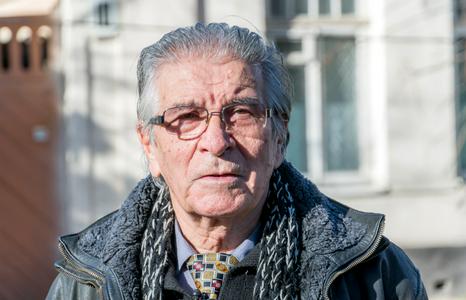 05 February05.02The “Guardian” of Old Tashkent Has Passed AwayRenowned local historian and popularizer of Uzbekistan’s history Boris Anatolyevich Golender dies
05 February05.02The “Guardian” of Old Tashkent Has Passed AwayRenowned local historian and popularizer of Uzbekistan’s history Boris Anatolyevich Golender dies -
 23 December23.12PhotoTokyo DriveJapan to invest about $20 billion in projects across Central Asia over five years
23 December23.12PhotoTokyo DriveJapan to invest about $20 billion in projects across Central Asia over five years -
 17 December17.12Sake for SixCentral Asia’s Rapprochement with Japan Comes with Hidden Pitfalls
17 December17.12Sake for SixCentral Asia’s Rapprochement with Japan Comes with Hidden Pitfalls -
 24 November24.11Here’s a New TurnRussian Scientists Revive the Plan to Irrigate Central Asia Using Siberian Rivers
24 November24.11Here’s a New TurnRussian Scientists Revive the Plan to Irrigate Central Asia Using Siberian Rivers -
 11 November11.11To Live Despite All HardshipUzbek filmmaker Rashid Malikov on his new film, a medieval threat, and the wages of filmmakers
11 November11.11To Live Despite All HardshipUzbek filmmaker Rashid Malikov on his new film, a medieval threat, and the wages of filmmakers -
 22 October22.10Older Than the Eternal CityWhat has Samarkand accomplished in its three thousand years of existence?
22 October22.10Older Than the Eternal CityWhat has Samarkand accomplished in its three thousand years of existence?
